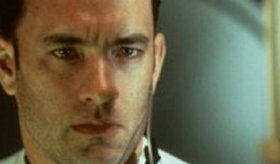|
|
| Tookey's Review |
|
| Pro Reviews |
|
| Mixed Reviews |
|
| Anti Reviews |
|
| Cast |
|
| |
 |
| |
| Released: |
1995 |
| |
|
| Genre: |
ACTION
ADVENTURE
BIOPIC
|
| |
|
| Origin: |
US |
| |
|
| Colour: |
C |
| |
|
| Length: |
135 |
|
| |
|
| |
|
|
| |
|
|
An expedition to the Moon has problems.
|
Reviewed by Chris Tookey
|
|
Apollo 13 is more than a superbly detailed reconstruction of the famous 1970 space flight which nearly ended in tragedy. This is a great film - as gripping as movies get.
See it, first and foremost, if you've ever wanted to be in space. It does for spacecraft what Das Boot did for submarines - you feel you are inside the capsule. You too will feel in imminent danger of incineration, running out of oxygen, or flipping off the earth's atmosphere into outer space forever.
See this movie, also, if you appreciate ensemble acting. Tom Hanks plays the humane father-figure of the expedition, Jim Lovell, with just the right blend of authority and anxiety. His performance was too self-effacing to win him a third consecutive Oscar, but it's a happy confirmation that there's one Hollywood star who's also a first-rate actor and team player.
The supporting cast is exemplary, with solid contributions from Kevin Bacon and Bill Paxton as Hanks's fellow astronauts, and outstanding ones from Ed Harris and Gary Sinise as their chief helpers on the ground. Kathleen Quinlan is no less splendid as Lovell's down-to-earth, supportive wife Marilyn, respectful of her husband's ambition but fearful of where it may lead.
Director Ron Howard wisely goes for understatement rather than melodrama. Equally welcome is his refusal to go for easy, patriotic options to trigger the audience's tears (although James Horner's overlush score does threaten to over-egg the pudding at the end).
But it's mainly thanks to the spare, intelligent script by William Broyles, Jr. and Al Reinert that this is the most powerful, intelligent and ironic film yet made about space travel.
The pivotal scene of the movie comes as the three astronauts transmit a live-from-space broadcast for the watching millions, showing off their latest technology (a portable video camera, no less) and modestly revelling in being all-American heroes. The irony is that the millions aren't watching. They can't be, since the American TV networks have reacted to the public's lack of interest and are continuing with their regular entertainment schedules. A few moments later, there's an explosion and the astronauts are news again. But the impact of that earlier scene - of a world grown apathetic and inward-looking - stays with us.
The unspoken subtext of Apollo 13 is that since 1970 we have lost something. We have gained greater mastery of technology, but mislaid our spirit of adventure. Twenty-five years ago, America used ground-breaking technology to make Apollo 13. Nowadays, America uses it to make movies about Apollo 13.
That message won't please everybody. The film is a belatedly counterblast to Philip Kaufman's critically acclaimed but commercially unsuccessful 1983 film, The Right Stuff, which debunked the space race as a PR exercise. Though Apollo 13 is no whitewash, Ron Howard's movie isn't interested in exposing the inadequacies of NASA, or apportioning blame for the manufacturing fault which jeopardised the expedition.
It is an unrepentantly masculine movie. But it would be to unfair to dismiss Apollo 13 as just another macho,"toys for the boys" adventure. The abiding impression is not of the technology, which looks primitive and dangerously fallible. The images you remember afterwards are faces - showing fear, resilience and courage under pressure.
Unlike Top Gun, it looks well beyond boyish heroics - the people on display here are mainly middle-aged men with arduous responsibilities, long careers behind them and (one is very much aware) lives beyond the confines of the movie. The virtues being prized here are not cockiness or sex appeal, but knowledge, expertise and professional commitment.
Most movies spin us the simplistic notion that success is a matter of individual heroics. Apollo 13 gets nearer the truth, which is that most successes are the result of teamwork, compromise, getting by, recovering from mistakes, and learning from experience. Because of this, the films it most resembles are Howard Hawks's classics about men working together under pressure - Dawn Patrol, Only Angels Have Wings and Air Force.
Watching and admiring this picture, I couldn't help thinking - and regretting - that British film-makers, with the honourable exception of Messrs Attenborough and Puttnam, have lost the habit of treating heroism with anything other than cynicism. Heroes have disappeared from British movies just as quickly - and disastrously - as they have from our schools' history books.
Commission British film-makers to make a film about the space race, and the odds are that they would produce a script which criticised it as a waste of resources. They would almost certainly choose to concentrate on an American disaster, preferably with hints of NASA incompetence and a cover-up. (The mid-air explosion of Challenger would be perfect.)
Apollo 13 is very different - a positive adventure story which exemplifies why Hollywood is the capital of the world's film industry. The people who made it understand that the world still needs heroes.
|
|
|
|
|
